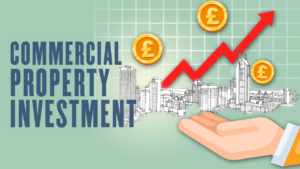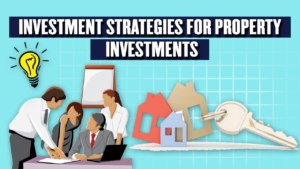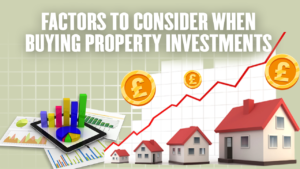This blog will discuss the 5 best types of property investment during rising rates. Rising interest rates can make borrowing money more expensive for investors, resulting in a drop in market demand. As a result, rental property prices may fall. On the other hand, certain types of real estate investments might do well under rising interest rates.
How will rising interest rates affect the housing market the UK?
Watch video HERE
“In the coming months, the impact of rising mortgage rates will start to affect demand and spending power, which we believe will result in a 10% decline in UK prices over the next two years.”
Types Of Property For Investment:

1. Buy-to-let property
 The term “buy-to-let” refers to the process of purchasing a residential houses with the intention of later renting it to residents. If the income is sufficient to pay the mortgage and other expenses, such as general upkeep, buy-to-let assets can create short-term rent. In the event that the value of the property increases, these investments may also generate returns over the medium to long term through capital growth.
The term “buy-to-let” refers to the process of purchasing a residential houses with the intention of later renting it to residents. If the income is sufficient to pay the mortgage and other expenses, such as general upkeep, buy-to-let assets can create short-term rent. In the event that the value of the property increases, these investments may also generate returns over the medium to long term through capital growth.
Real estate investors should take into account other aspects in addition to the fees of a buy-to-let mortgage when planning their financial plans. Budgets should account for maintenance costs and void rental periods.
Tax Benefits with Buy To Let:
- Mortgage interest deduction: Landlords may deduct the interest they pay on their buy-to-let mortgages from their taxes.
- Wear and tear allowance: Landlords can deduct the expense of replacing equipment and furniture in their rental properties from their taxes.
- Capital gains tax relief: Tax exemption on capital gains is available to landlords who sell their rental properties and realize a profit.
More Guides HERE:
Buy to Let Mortgages Explained
Are Buy to Lets Still Worth it in 2023?
Do’s & Don’ts of Buy To Let Mortgages!
2. Commercial property investment

Commercial real estate offers a variety of investment opportunities that can be broadly divided into the following groups:
- Supermarkets, high-street stores, malls, and retail warehouses
- Restaurants, lodging establishments, gaming establishments, movie theaters, and dining establishments
- Offices, office parks, mixed-use structures, and multi-tenant structures
- Industrial: Buildings used for storage, production, or logistics; sheds, industrial parks, etc.
- Understanding local demand can aid real estate investors in making better educated decisions about the investment’s potential. This is just like with buy-to-let real estate investments.
Although investing in commercial real estate requires knowledge, it is possible to do so in a fund that is managed on behalf of the shareholders. Options for investing in commercial real estate include:
- Direct investment: Acquiring all or a portion of a business property
- A collective investment plan that invests in a portfolio of commercial properties is known as a direct commercial property fund.
- Individuals can purchase and sell shares of listed real estate businesses on the stock market.
- A collective investment plan is known as an indirect property fund that purchases stock in real estate companies listed on the stock market
Due to the Bank of England’s commitment to maintaining a low interest rate environment, current commercial property lending rates patterns in the UK indicate that rates are likely to stay reasonably low in 2023. According to the Bank of England, interest rates will remain low until there has been a noticeable improvement in meeting its inflation target and fostering economic recovery. Yet, a number of variables, including inflation, economic expansion, and consumer demand, among others, can have an impact on lending rates.
Potential benefits and risks to consider:
Advantages
- Compared to residential real estate, commercial buildings can produce higher rent and continuous cash flow.
- Residential leases sometimes have shorter durations than commercial leases, giving real estate investors a stable source of revenue.
- Compared to other property categories, commercial land may be less susceptible to changes in interest rates.
Risks
- Finding suitable tenants for commercial rental property may be more difficult than for residential real estate.
- Commercial properties may have higher initial costs and ongoing maintenance costs than residential real estate.
- Commercial rental property may have longer periods of vacancy between tenants.
3. Flats
Are Flats a Smart Investment?
 Direct experience with a certain type of real estate investment, whether positive or negative, is the greatest method to build an opinion. In contrast, many people create opinions about flats without having any first-hand experience. This could be because apartments have a negative reputation, you are unlikely to own the freehold, or you feel like you are living above or next to other people. All of these things might be true, but there is also a sizable population that drives up demand for apartments, making them a profitable and approachable way to profit from the real estate market.
Direct experience with a certain type of real estate investment, whether positive or negative, is the greatest method to build an opinion. In contrast, many people create opinions about flats without having any first-hand experience. This could be because apartments have a negative reputation, you are unlikely to own the freehold, or you feel like you are living above or next to other people. All of these things might be true, but there is also a sizable population that drives up demand for apartments, making them a profitable and approachable way to profit from the real estate market.
Yes, they are, but as always, there are some additional restrictions. As with any investment, you must clearly define your goals in terms of the amount of money you can contribute. If you properly promote them and do your geographical research. There are many apartments available that can give you the return you need.
Considerations:
- Leasehold Agreements: Since many apartments in the UK are leasehold homes, buyers may also be responsible for paying the freeholder’s ground rent and service fees. When making a purchase of a flat, it is crucial to carefully analyze the leasehold agreement.
- Market Saturation: Flats might be increasingly common in some parts of the UK, which could cause a saturated market and more competition for tenants.
- Maintenance costs: Although maintaining apartments may be less expensive than maintaining homes, investors may still be liable for continuing maintenance and repair costs, such as buying replacement appliances or fixing plumbing problems.
- Management Concerns: If the apartment is a part of a bigger building or complex, there might be more management concerns to take into account, like disagreements with other owners or renters or adjustments to building management fees.
Overall, individual property, location, and market demand all play a role in determining whether or not flats are a wise investment in the UK. Before making a choice, it’s critical to do extensive research, weigh the risks and advantages, and speak with a qualified real estate advisor.
4. Property Crowdfunding
Property crowdfunding is a form of investing in property in which a group of investors, or “the crowd,” combine their money to purchase a property or lend it to developers as a loan to fund property development.
Individuals typically contribute a little portion of the total. This can be beneficial for a number of reasons, including the speed with which a large sum of money can be raised and the fact that investors willing to make minor commitments now have access to transactions they otherwise wouldn’t have.
Benefits of Crowdfunding:
People may be considering and interested in these kinds of real estate opportunities for the following reasons
- Opportunity to diversify holdings in investment portfolios and assets
- The capacity to hold, in addition to residential properties, commercial real estate or real estate portfolio assets gaining access to fresh or unique opportunities
- The ownership-related risks are shared by a number of people.
- Financiers can invest in larger real estate holdings thanks to shared cost structures than they would normally be able to.
- Compared to traditional real estate ventures, initial capital requirements are less.
5. Flipping Properties
In the UK, flipping real estate is the process of getting a house, fixing it up, and then offering it for sale. The following are some potential benefits and factors to think about while flipping homes in the UK.
Advantages:
- Profit Potential: Especially how high inflation rates are in the real estate market when property values are rising, investors have the opportunity to make sizable gains by flipping houses.
- Property Control: Flipping houses gives investors the chance to take control of the property and make changes that could raise its value.
- Quick Turnaround: Compared to other real estate investment strategies, flipping homes can offer a comparatively short turnaround, enabling investors to enjoy their earnings more quickly.
Risks:
- Expenses up front: The purchase price, renovation charges, and other associated fees that come with flipping real estate have a big impact on the total profitability of the venture.
- Market Risk: Flipping properties involves market risk, which implies that adjustments in the real estate market may have an impact on the investment’s value and the prospect of a profitable sale.
- Renovation risks: While renovating a house, there is a chance that there will be unforeseen repair bills, delays, or damage to the property itself.
Investment strategies for property investment during rising rates:
While value, growth, and income investing are typical stock investment techniques, they can also be employed to make real estate investments when interest rates are rising. This is how:
- Value Investing: In value investing, properties that have the potential to experience long-term capital growth are sought for that are undervalued or underpriced. Investors may concentrate on locating properties that have solid fundamentals, such as a good location and possibility for refurbishment or development, but are now priced lower due to increased interest rates.
- Growth Investing: Growth investment is seeking for real estate with the potential for a substantial value increase over time, generally as a result of market demand or development potential. When interest rates are rising, investors might concentrate on regions that are experiencing rapid economic growth and development, such as brand-new commercial or residential real estate construction that is anticipated to draw tenants or buyers in the future.
- Income investing: Involves searching for homes that generate a steady and reliable income stream through rental income. Investors may concentrate on assets with constant rental demand or long-term leases, such as commercial or residential properties in prime locations, during an increase in interest rates.
It’s important to remember that no one investment strategy is appropriate for everyone, and the optimal course of action may vary depending on an individual’s unique situation and financial objectives.
It is advised to seek the advice of a qualified real estate expert or property agent to assess investment options and determine the most suitable course of action for a given set of circumstances.
Factors To Consider When Choosing A Property Investment During Rising Rates:
1. Interest Rates
Because interest rates have an impact on property values and rental income, it is important to keep an eye on interest rates when considering a property investment. Higher interest rates can reduce demand for property while increasing borrowing costs, while lower interest rates can increase demand while decreasing borrowing costs.
Learn more about interest rates in my YouTube channel:
The TRUTH About Mortgage Interest Rates In 2023
How High Will Interest Rates Go In 2023?
Interest Rates Are Rising NOW WHAT?
2. Affordability
Affordability is always an important factor to consider when making a property investment. In a rising-interest-rate environment, it’s important to make sure that the investment remains within your budget and that you can comfortably afford any increased borrowing costs.
3. Type of Real Estate Investment
Your type of real estate investing can also affect the possible returns. While short-term rental property may be more stable during economic downturns, commercial buildings may have longer lease periods and built-in rate increases. Potential real estate investing takes into account the benefits and drawbacks of each kind property.
4. Location
 While assessing a potential investment property, you should take into account elements like neighborhood amenities, access to transit, and the general attractiveness of the location.
While assessing a potential investment property, you should take into account elements like neighborhood amenities, access to transit, and the general attractiveness of the location.
Tips For Making Money Investing in Real Estate With Increasing Rates
Property investment during a period of rising prices might be a wise move for creating long-term wealth and passive income. So it’s crucial to approach real estate investment thoughtfully and strategically. Here are some pointers for making profitable real estate investments as interest rates rise:
1. Do Extensive Research
Before making an investment in real estate, it’s crucial to undertake an extensive study on the neighborhood market and financial situation. Analyzing property valuations and trends, vacancy rates, rental demand, and economic growth may be necessary for this. It’s crucial to comprehend the particular dangers and opportunities involved in various forms of real estate investments, including buy-to-let, business properties, and flipping properties.
2. Diversify Your Investment Portfolio
A successful real estate investment involves diversification. Investors can spread their risk and improve their chances of creating long-term profits by making investments across a variety of property kinds and geographic regions. An investor might, for instance, decide to engage in both residential and commercial real estate, as well as in properties situated in various markets or geographical areas.
Risks With Property Investment During Rising Rates:
1. Market risk
Market risk refers to the risk of loss due to factors affecting the overall market. Changes in demand, supply, economic conditions, and investor sentiment are all examples of such factors. Market risk can have an impact on the value of a real estate investment as well as its ability to generate income.
2. Interest rate risk
Rising interest rates can increase borrowing costs and reduce the profitability of property investments. This can result in lower real estate values, income and capital gains, and returns on investment property. Risks related to interest rates can have an impact on both short term and long term rental property.
3. Economic risk
KEY TAKEAWAY:
Your circumstances, objectives, and interests will determine the best real estate investment for you. The choice ultimately comes down to weighing the benefits and drawbacks of each option, despite the importance of the factors that must be taken into account. Different types of real estate investments are more profitable in different market conditions, so location is an important consideration.
Paying off your mortgage early is not smart read why here.






